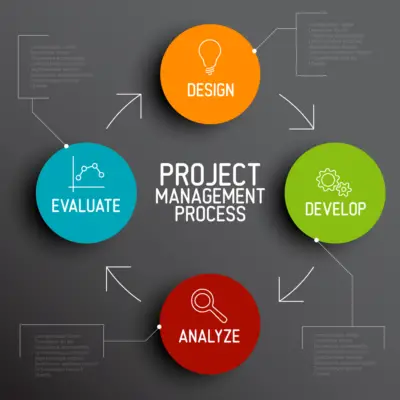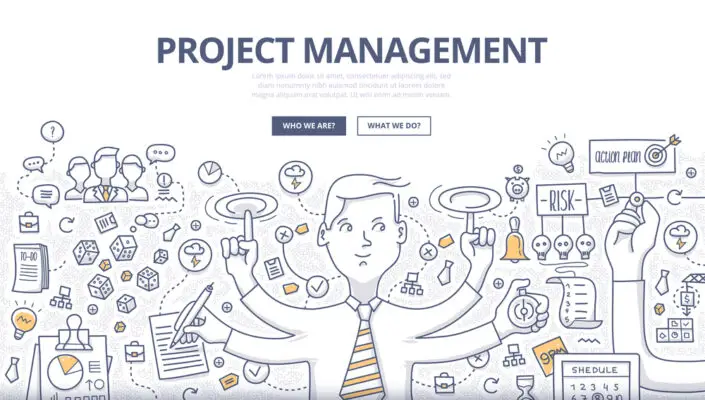The transition from Project Management to Product Management is a nuanced and strategic career evolution that involves a multifaceted understanding of both disciplines.
We will carefully explore this professional pathway, highlighting the skills, methodologies, and mindset shifts necessary for a successful transition.
While project management focuses on the successful execution of specific projects, product management necessitates a broader view, centring on a product’s lifecycle, value, and user experience.
This in-depth guide will delineate the similarities and differences between the two roles, offering actionable insights and practical advice for professionals contemplating this career move.
Through marrying the principles of project execution with a broader vision of product strategy, this transition can lead to an enriching and dynamic professional landscape.
This article explores the process of transitioning from project management to product management.
It provides a comprehensive overview of project management, highlighting its key elements and responsibilities.
The article then delves into the necessary preparations for this transition, offering insights and guidance.
Additionally, it discusses the steps involved in successfully moving from project to product management and offers strategies for establishing oneself as an effective product manager.

What is Project Management?
Project Management is initiating, planning, executing, controlling, and closing a project to achieve specific goals and meet specific success criteria. Essentially, it’s the process of guiding a project from conception to completion, ensuring that it’s completed on time and within budget.
This explores the concepts of Product Management and the key differences between Project and Product Management.
Product Management refers to strategically managing a product throughout its lifecycle, from conception to launch.
It involves a combination of market research, product development, and marketing strategies to ensure the success and profitability of the product.
On the other hand, Project Management focuses on the planning, execution, and monitoring of specific projects with a defined scope, timeline, and deliverables.
The main distinction between the two lies in their objectives and scope. Product Management takes a more holistic and long-term approach, while Project Management focuses on completing individual projects.
What is Product Management?
Product management is a discipline that involves the planning, development, and marketing of a product or a set of products. It differs from project management in several ways.
While project management focuses on executing specific projects within a defined timeframe, product management takes a broader perspective by overseeing the entire lifecycle of a product, from conception to launch and beyond.
This transition from project management to product management can be a logical career path for project managers with a strong understanding of the product development process and excellent communication and planning skills.
Successful product managers must collaborate effectively with cross-functional teams, gather and analyze market data, and make strategic decisions to ensure the product’s success in the market.
Product management is a multifaceted role requiring technical expertise, business acumen, and strategic thinking. A successful product manager is responsible for managing the entire lifecycle of a product, from ideation to launch and beyond.
They work closely with software developers, business analysts, and key stakeholders to define the project scope, develop market strategies, and ensure that the product meets the target market’s needs.
One of the key skills of a product manager is their ability to prioritize and manage the product backlog. They must have a deep understanding of customer needs and be able to translate those needs into actionable items for the development team.
Additionally, they need to effectively communicate and collaborate with senior product managers and other cross-functional teams to ensure the successful delivery of the product to market.
A career in product management can be rewarding and fulfilling for those passionate about building innovative products and driving business outcomes.
Transitioning to product management from a technical or business background is possible with the right skills and experience. Junior product managers can gain valuable experience by working closely with senior product managers and taking on more responsibilities over time.
Product design is another important aspect of product management. A product manager needs to have a good understanding of user experience design principles and be able to work closely with product designers to create a product that is both functional and visually appealing. They also need to have a strong understanding of the product life cycle and be able to develop and execute product plans that align with business objectives.
In addition to technical and business skills, a successful product manager should possess excellent communication skills, as they will need to communicate effectively with stakeholders at all levels of the organization.
They should also be skilled in budget planning, quality assurance, and quality control to ensure the product’s long-term success.
There are many common paths to a career in product management, with opportunities available in a wide range of industries and sectors.
Many product managers find employment at tech companies, where they can work on cutting-edge products and be part of the digital transformation journey. However, product management roles can also be found in other industries, such as healthcare, finance, and insurance.
Product management is a dynamic and challenging role that requires a unique blend of technical, business, and communication skills.
A successful product manager can navigate the complexities of product development and drive business impact by delivering products that meet customer needs and align with business objectives. With the right skills and experience, a career in product management can be a fulfilling and rewarding journey.
Key Differences Between Project and Product Management
One notable distinction between project and product management lies in their respective focuses and scopes.
While project management is centered around the successful execution of a specific project within defined parameters such as time, budget, and resources, product management is more concerned with the strategic planning and development of a product throughout its entire lifecycle.
Project management is temporary and task-oriented, whereas product management is ongoing and strategic.
Another key difference is the involvement of stakeholders. In project management, stakeholders are typically involved during the execution phase, whereas in product management, stakeholders are involved throughout the entire product development process.
Additionally, project management focuses on delivering specific project outcomes, while product management focuses on creating a product roadmap and managing the entire product lifecycle.
Understanding these key differences is essential for professionals transitioning from project management to product management and climbing the career ladder in product development.
Preparing for the Transition from Project to Product Management
This aims to provide insights and analysis into the key points of transitioning from project to product management.
It will explore the importance of understanding the role of a product manager, developing the necessary skillsets required for this role, gaining relevant experience, and exploring various career paths and opportunities available in the field.
Understanding the Role of a Product Manager
To understand the role of a product manager, it is important to examine the responsibilities and tasks associated with this position.
A product manager is crucial in bridging the gap between the development team and the market, ensuring that the product meets customer needs and achieves business goals.
They are responsible for the product’s overall success by defining the product strategy, prioritizing features, and guiding the development process. The following table provides a snapshot of the key responsibilities and tasks of a product manager:
| Responsibilities | Tasks |
|---|---|
| Product Strategy | Defining product vision |
| Collaborating with the development team | |
| Setting product roadmap | |
| Defining target market | |
| Cross-functional Collaboration | Collaborating with development team |
| Working with marketing and sales | |
| Gathering feedback from customers | |
| Product Development | Prioritizing features |
| Conducting user testing | |
| Monitoring product metrics |
Understanding the role of a product manager is crucial for anyone looking to transition from project management to product management. It requires a shift in mindset and acquiring new skills to navigate this career move successfully.
Developing Necessary Skillsets
Developing the necessary skillsets involves deeply understanding market analysis, customer research, and product development processes. In the product management role, individuals oversee the entire product development process, from ideation to launch.
To excel in this role, product managers need a diverse set of skills. Strategic planning is crucial, as it enables product managers to align their products with market trends and customer demands. Customer satisfaction is also key, as product managers must continuously gather feedback and improve to meet customer needs.
Project management skills are essential for managing timelines and resources effectively. Technical skills are necessary to understand the product’s technical aspects and ensure successful implementation. Strong communication skills are also crucial for collaborating with cross-functional teams and stakeholders.
Lastly, business analysis skills help product managers make data-driven decisions and measure product success.

Gaining Relevant Experience
Gaining relevant experience in product management involves obtaining hands-on exposure to market analysis, customer research, and product development processes. To gain this experience, individuals can consider the following:
- Seek opportunities within their current role: Individuals with project management experience can look for projects or initiatives that allow them to collaborate with cross-functional teams, understand customer needs, and contribute to product decisions.
- Volunteer for product-related tasks: Additional responsibilities such as assisting with product launches, conducting market research, or participating in user testing can provide practical experience and demonstrate a genuine interest in a product management career.
- Seek mentorship and constructive feedback: Engaging with experienced product managers and seeking their guidance can help individuals develop their technical knowledge and gain insights into best practices.
- Leverage transferable skills: Project managers can highlight their abilities in stakeholder management, strategic planning, and problem-solving as transferable skills that are valuable in a product management role.
Exploring Career Paths and Opportunities
Exploring career paths and opportunities in product management requires individuals to assess their skills, interests, and goals to identify potential roles and industries that align with their aspirations.
The transition from project management to product management involves understanding the key differences between the two roles and acquiring the necessary skills and knowledge.
Product management focuses on the strategic aspects of developing and launching new products, while project management is more concerned with the execution and delivery of specific projects.
Individuals need to develop their expertise in market research, product strategy, and product development to make a successful move. They may also need to acquire additional technical skills or industry-specific knowledge.
Exploring different industries and networking with product management professionals can help individuals better understand the opportunities available and make informed decisions about their career path.
Making the Transition from Project to Product Management
Transitioning from project management to product management requires a thorough evaluation of one’s current project management role, including identifying transferable skills and experiences that can be leveraged in the new field.
Building connections with potential employers or colleagues in product management is crucial for gaining insights into the industry and accessing job opportunities.
Additionally, assessing one’s marketability as a product manager candidate is important by analyzing the demand for such professionals, understanding the required qualifications, and identifying areas for personal and professional development.
Evaluating Your Current Role in Project Management
Assessing one’s current position in project management involves evaluating the scope of responsibilities, skill set required, and potential for growth within the role. To evaluate your current role in project management, consider the following:
- Project Management Knowledge:
- Assess your understanding of project management principles, methodologies, and best practices.
- Determine if you possess the necessary knowledge to manage projects effectively.
- Role as a Project Manager:
- Evaluate your ability to lead a development team and foster collaboration.
- Assess your skills in setting and managing project goals and expectations.
Leveraging Existing Skillsets and Experiences
Utilizing one’s current skillsets and experiences is essential in maximizing effectiveness and achieving success in a project-oriented role. This holds when transitioning from project management to product management.
While the two roles share similarities, such as strong time management and communication skills, product management requires additional competencies, such as business acumen and the ability to gather and analyze customer feedback.
Leverage their existing skillsets and experiences, project managers can effectively move into product management. The table below illustrates the transferable skills and experiences that project managers can leverage:
| Transferable Skills | Transferable Experiences | Relevance to Product Management |
|---|---|---|
| Time Management | Leading project teams | Balancing multiple priorities and deadlines |
| Communication Skills | Stakeholder management | Collaborating with cross-functional teams and gathering requirements |
| Problem-solving | Risk assessment | Identifying market opportunities and addressing product challenges |
Building Connections with Potential Employers or Colleagues in the Field of Product Management
Establishing meaningful connections with professionals in product management can greatly enhance career opportunities and foster a deeper understanding of industry trends and best practices.
Building connections with potential employers or colleagues in the field can provide valuable insights and opportunities for professional growth.
To effectively build connections in product management, consider the following:
- Attend industry conferences and networking events:
- Engage in conversations with professionals in the field.
- Exchange contact information and follow up with personalized emails.
- Utilize online platforms:
- Join relevant professional groups on platforms like LinkedIn.
- Participate in online discussions and share insights.
Assessing Your Marketability as a Product Manager Candidate
Evaluating one’s qualifications and skills as a candidate for a product manager position involves objectively analyzing relevant industry experience and expertise.
When considering moving from project management to product management, one must assess one’s marketability in this new role.
Product management requires unique skills, including strategic thinking, market analysis, and the ability to manage cross-functional teams.
Assessing marketability involves evaluating one’s knowledge and experience in product strategy, product development, and product lifecycle management. Additionally, understanding the specific requirements and expectations of the target industry or company is crucial.
Establishing Yourself as a Successful Product Manager
Developing an effective product strategy and roadmap is crucial for the success of a product manager.
A well-defined strategy helps align the product with the overall business goals and objectives, while a roadmap provides a clear direction for the product’s development and evolution.
Developing an Effective Product Strategy and Roadmap
Creating an effective product strategy and roadmap is crucial for successfully transitioning from project to product management. This section aims to provide insights on developing an effective product strategy and contextually relevant roadmap.
To develop an effective product strategy and roadmap, consider the following:
- Understand the market: Conduct market research and analysis to gain deep insights into customer needs, market trends, and competitive landscape. This will help in identifying opportunities and defining the product vision.
- Define clear goals and objectives: Set clear and measurable goals for the product, aligned with the overall business strategy. This will provide a clear direction and focus for the product team.
- Prioritize features and initiatives: Prioritize the features and initiatives based on their impact and feasibility. This will ensure that resources are allocated effectively and the most valuable features are delivered to the market.
- Communicate and collaborate: Establish effective communication channels and collaborate with cross-functional teams to ensure alignment and buy-in for the product strategy and roadmap.
Frequently Asked Questions
What Are the Key Differences Between Project Management and Product Management?
The key differences between project and product management lie in their objectives, scope, and focus.
While project management is concerned with delivering a specific outcome within a defined timeframe, product management involves the full lifecycle management of a product, from concept to market.
How Can I Effectively Communicate and Collaborate With Cross-Functional Teams as a Product Manager?
Effective communication and collaboration with cross-functional teams is essential for product managers.
This includes clear and concise communication, active listening, fostering a collaborative environment, and utilizing appropriate tools and techniques to ensure effective teamwork and alignment towards product goals.
What Skills or Qualifications Are Required to Make a Successful Transition From Project Management to Product Management?
The skills and qualifications typically required to transition from project management to product management include a strong understanding of product development processes, strategic thinking, market research and analysis, effective communication, and leadership capabilities.
How Can I Effectively Prioritize and Manage Competing Priorities as a Product Manager?
Effectively prioritizing and managing competing priorities is a crucial skill for product managers.
This involves assessing the importance and urgency of tasks, collaborating with stakeholders, and utilizing prioritization frameworks to ensure the successful execution of product strategies.
Are There Any Specific Challenges or Obstacles Individuals Commonly Face When Transitioning From Project Management to Product Management, and How Can They Be Overcome?
Challenges and obstacles when transitioning from project management to product management include adapting to a strategic focus, understanding the product lifecycle, and developing customer-centric thinking.
These challenges can be overcome through training, mentorship, and practical experience.

Conclusion
Transitioning from project to product management requires careful preparation and a strategic approach.
Understanding the differences between the two roles and acquiring the necessary skills and knowledge to succeed in product management is important.
Building a strong foundation in market research, customer insights, and product development will help establish oneself as a successful product manager.
Leveraging project management experience and adapting to the unique challenges of product management, professionals can make a successful transition and excel in their new roles.

Chris Ekai is a Risk Management expert with over 10 years of experience in the field. He has a Master’s(MSc) degree in Risk Management from University of Portsmouth and is a CPA and Finance professional. He currently works as a Content Manager at Risk Publishing, writing about Enterprise Risk Management, Business Continuity Management and Project Management.

